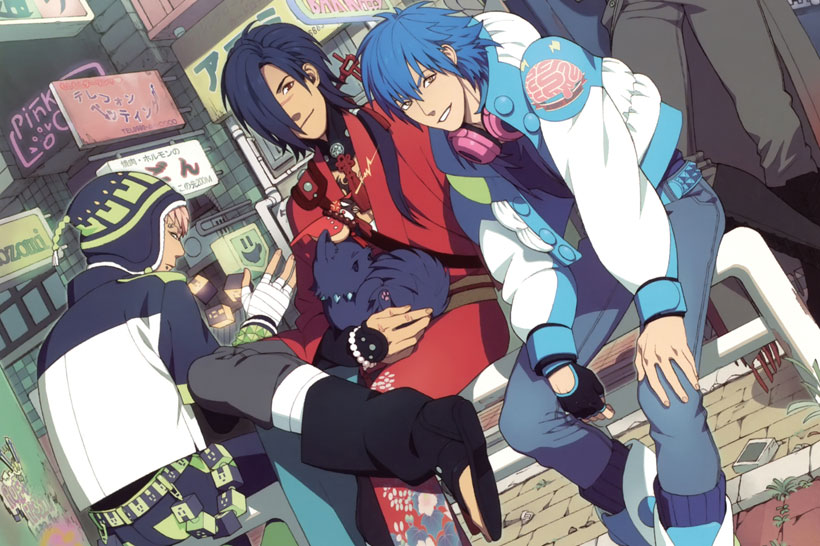When Arata Miyako shows up for his first day at his new job at the Shinjuku Ward’s Nocturnal Community Relations Division, he quickly discovers that it’s not your average office job when he is tasked with taking care of the many supernatural beings that make Shinjuku their home. Shown the ropes by his co-workers Theo Himezuka and Kyouichi Sakaki, Arata learns that supernatural beings, or “Anothers”, can be extremely dangerous and have their own language not understood by humans. Except, Arata can understand the Anothers, and what’s more, many of them seem to recognise him – referring to him by the name Abe no Seimei. Perhaps with his strange gifts, Arata can bridge the ever-widening rift between humans and Anothers – but first he has to figure out why an Aztec trickster God has started following him around.

Midnight Occult Civil Servants is a series with no shortage of inspiration to pull from – filled with tengu, angels, fairies, temple spirits and Gods, the 12-episode series plays in a sandbox of supernatural creatures using the gimmick of civil servanthood as a fun lens to view the story and situations that unfold. Based on the manga by Yoko Tamotsu, I came into the series blind and knowing nothing about the premise or its characters and was genuinely surprised by the show’s sense of fun and simple but well executed episodes. It sticks pretty closely to the “monster of the week formula”, with Arata, Theo and Kyouichi facing a new problem, generally caused by an Another, each episode and figuring out how to overcome it. These stories of quarrels between Anothers and solving missing person cases are simple but effective, and the series has a surprisingly efficient overarching narrative spread across its 12 episodes that manages to balance mini character arcs and the key themes that carry Midnight Occult Civil Servants to its final conclusion.

Fans of the series Natsume’s Book of Friends will likely find something to love about Midnight Occult Civil Servants, as it has a similar energy and premise, with Arata accumulating Another friends through his work with the Nocturnal Community Relations Division. Similar to Natsume’s Book of Friends, Arata’s connection to many of these Anothers is due to a relative (in this case, Abe no Seimei), and his sense of kindness for Anothers, that often places him in dangerous situations, much to the exasperation of his co-workers. Arata’s friendly demeanour and the series’ “monster of the week formula” lends itself to introducing a host of interesting characters, and the show does a good job of making the various Anothers feel diverse and interesting, borrowing supernatural beings and concepts from Japanese legends, Greek mythology, and more.
Arata’s most interesting relationship with an Another is the Aztec trickster God Huehuecoyotl, referred to in the series as Kohaku. Kohaku’s past relationship with Arata’s relative and doppelganger Abe no Seimei makes the trickster one of the more mysterious and interesting characters in the show, as their allegiance to Arata is complicated and results in them both aiding and hindering the Nocturnal Community Relations Division. Kohaku’s presence lends a fun and chaotic energy to the series and raises interesting questions about Arata and his ancestor, and I wish they had more of a presence in the series to really explore these things. Unfortunately, Kohaku’s character arc is resolved with very little fanfare and afterwards they are not really present in any meaningful way in the series, even for the final episodes. This brings me to my main issue with the series – throughout my viewing of Midnight Occult Civil Servants, while I genuinely enjoyed my time with it, I was consciously aware of its limitations.

Midnight Occult Civil Servants feels like a short anime adaptation of a much longer manga, establishing a lot of interesting concepts and story beats, but unable to resolve them in meaningful ways due to the limitations of its 12-episode run. This results in characters like Kohaku having rushed arcs and Abe no Seimei’s place in the story and impact on Arata just disappearing as episodes progress. The series even establishes narratives and antagonists that simply do not show up again later in the anime, although I suspect they resurface in the manga. The series is still solid – as I alluded to previously, the series is very efficient in hitting all the beats it needs to, and provides what is needed to give closure to characters and its narrative, but it feels like its 12-episode limit prevented it from really exploring the more interesting themes and narratives it was discussing. Additionally, while the two finale episodes of the series actually work pretty well in bringing together previously established elements and the series’ overarching theme of bridging the divide between humans and Anothers, the twelfth and final episode that follows the finale is just filler that could have been placed anywhere towards the beginning of the series. Despite these issues, Midnight Occult Civil Servants is still a solid series and I was never disappointed in the series itself, just the limitations that I felt were placed on it, and I came out of my viewing of the series wishing I could spend more time with its characters and in its world.

Midnight Occult Civil Servants is a charming series that I really enjoyed my time with. While at times it was very apparent that the series was only depicting a smaller slice of a larger story contained in the manga (which is apparently still running), the show still delivers a concise and fun story that ties everything together in the end, while keeping its sense of fun and mystery. Anyone looking for a short but solid series of the supernatural variety, and any fans of Natsume’s Book of Friends looking for something with a similar vibe should definitely check out Midnight Occult Civil Servants.
A review copy was provided by Madman Entertainment to the author for the purpose of this review.





